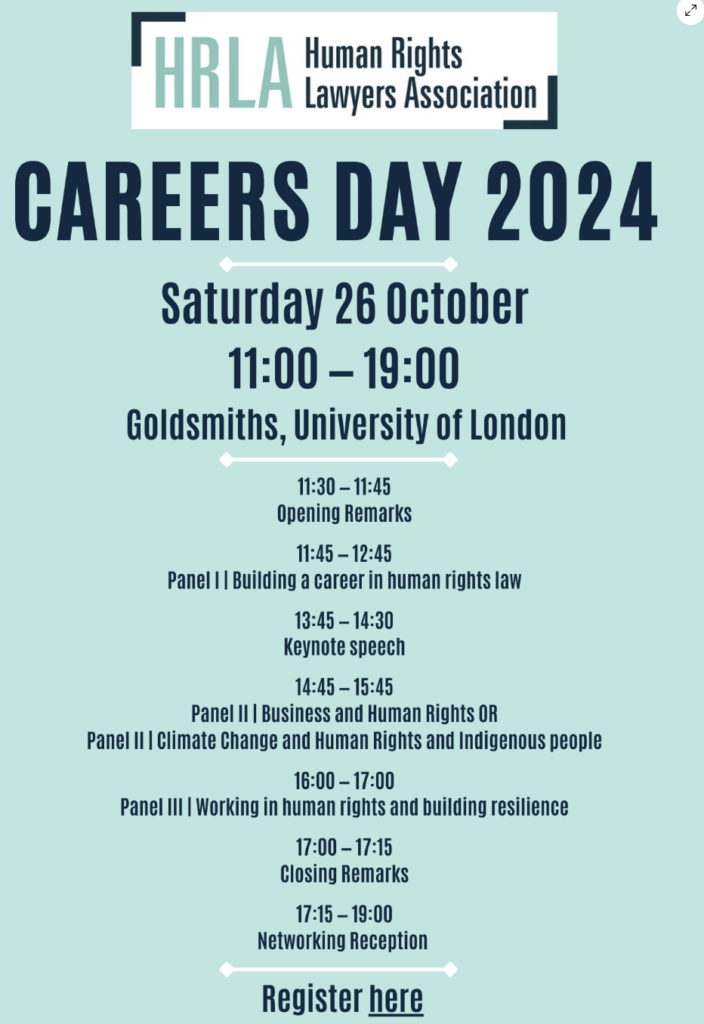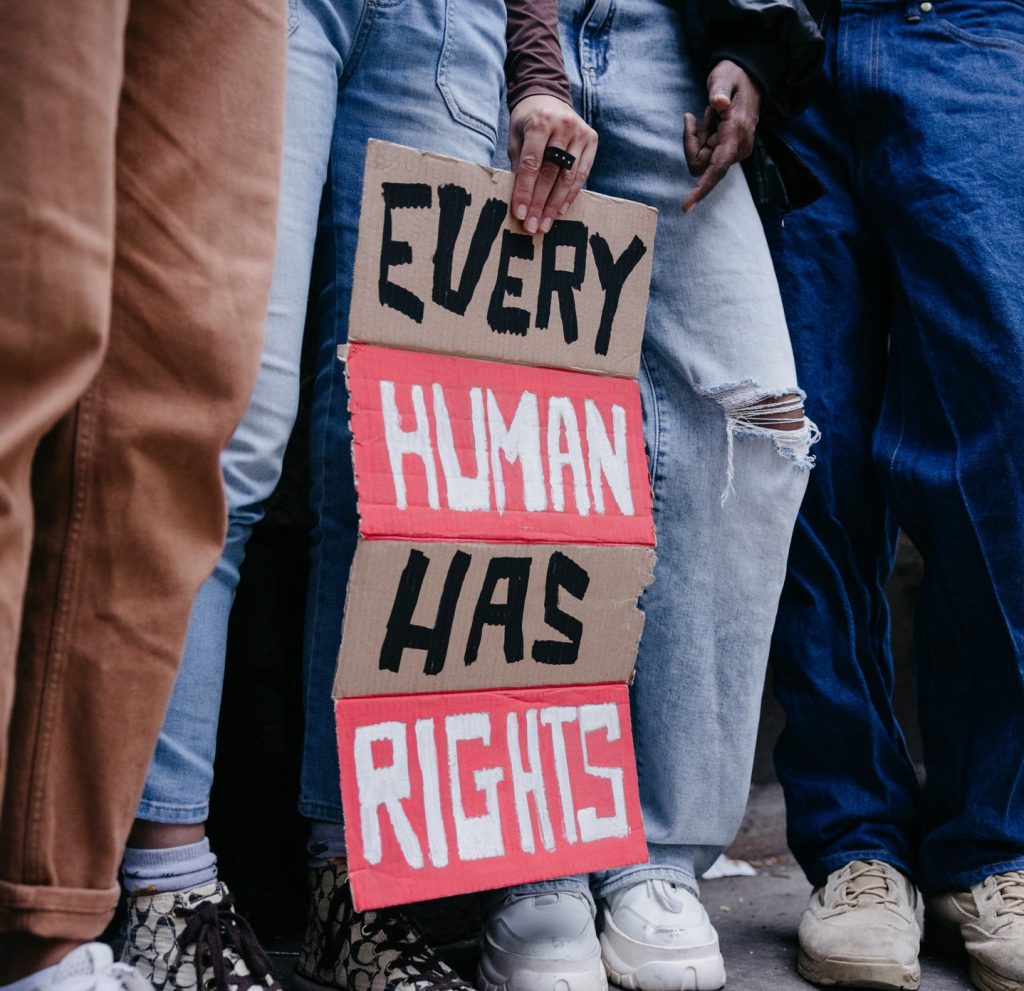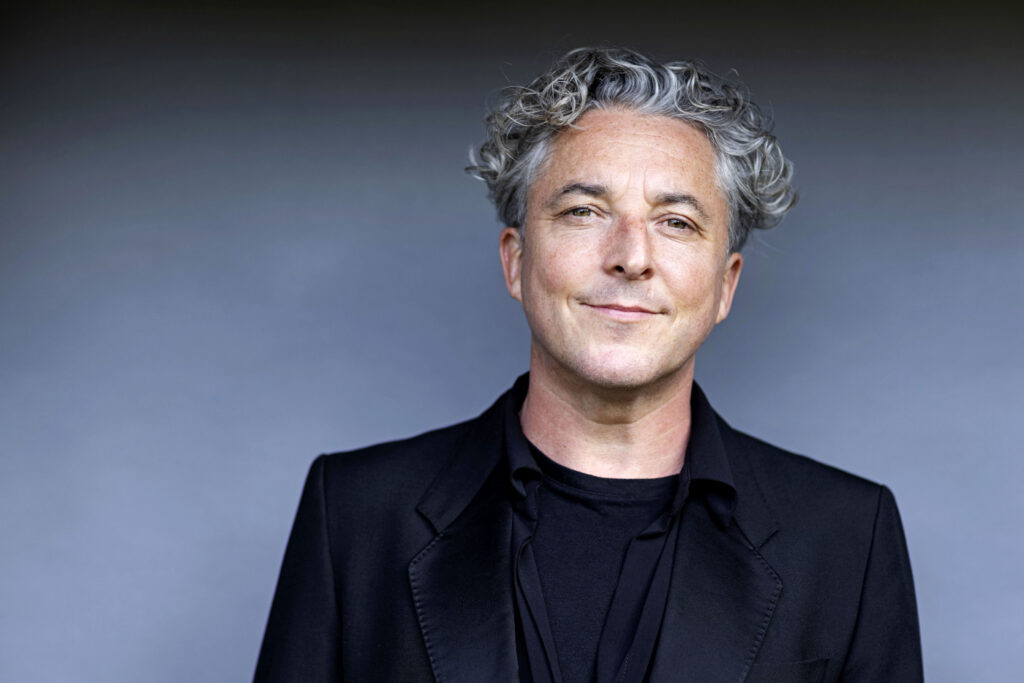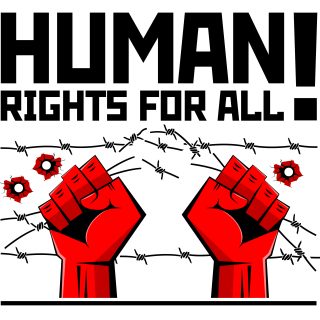It’s grey, it’s Saturday, it’s taken me an hour to get here. So I am surprised by my waggy-tailed enthusiasm on discovering the locked gates of Goldsmiths College as I attempt to access the Human Rights Lawyers Association (HRLA) Careers Day. Channelling my puppy dog energy, I sniff out an alternative route through a church yard and onto campus, arriving perfectly (if also a little sweatily) on time.

Organised by the HRLA’s Junior Lawyers Committee and sponsored by Leigh Day, this annual event wastes no time getting stuck in (a little startlingly for my still-not-fully-caffeinated weekend brain) with a high calibre panel offering searingly honest insights into ‘Building a Career in Human Rights Law’.
Shaimaa Al-Mukhtar, a trainee solicitor with Leigh Day specialising in non-recent child abuse cases, kicks off by detailing her relatively fresh route into the profession. Working her way through various volunteer and paralegal positions in NGOs and charities, her main exhortation was to “get clear” on your motivation. On the inevitable tough days, you need to know why this work matters. She was also the first of the panellists to warn about the vicarious trauma of this work, and the need for self-care.
Echoing Shaimaa, barrister Will Durrands stressed the importance of balancing the pressures of the profession with outlets for stress—whether exercise, creative hobbies, or confiding in close friends—because “without looking after yourself, you can’t look after your clients.” Chair of the HRLA, Joe Middleton KC, further affirmed this point, adding that a human rights career doesn’t have to begin in high-profile firms and that smaller organisations, as well as being excellent places to learn, might align more closely with personal values.
After a generously provided lunch as part of this entirely free-to-attend day, Jason Pobjoy of Blackstone Chambers delivered a low-key keynote, offering ten lessons from his career emphasising that there is “no typical path to becoming a human rights lawyer”. His message was that a breadth of experience across domestic, international, commercial and pro bono practice had allowed him a diverse, exciting and rewarding career.
The event’s highlight, for me, was the panel on “Climate Change, Human Rights and Indigenous People,” in which the inspirational Monica Feria-Tinta of 20 Essex Chambers headlined with an exhilarating perspective. Feted for her extensive work in public international law, Feria-Tinta argued that the developing field of rights-based climate litigation has been driven not by academia or campaigners, but from “deep legal thinking from practitioners”. She expressed her excitement about a new generation of practitioners about to engage with this developing field of litigation, whilst also sharing her discomfort with framing ‘human rights’ work as a ‘career’. Recognising that she works in a commercial set of chambers and that:
“if you want to be a good human rights lawyer, you first of all have to be a good lawyer – a contract lawyer, a good tort lawyer because you are not going to be able to do anything interesting if you don’t know your basics”
…she also noted that this work, for her, is grounded in personal experience and purpose. She extolled that human rights thinking is “not neutral” because its purpose is “to protect the most vulnerable”.
Monica’s words were a powerful reminder of the stakes involved in climate litigation and human rights work more broadly. Her journey has been shaped by cases that challenge global power dynamics and, on occasion, threats to her personal safety. Her closing call to arms (to work hard, think deeply and approach the field with full-hearted personal integrity) and conviction that “big things come out of deep and dark moments in humanity” landed powerfully for many of us in the room.

I had to leave before the closing session on “Building Resilience”, but I left satisfyingly refuelled – synapses firing, feet springing down the three flights of concrete stairs, nearly crashing into the also-leaving Feria-Tinta as we approached the exit from different directions. She was uncertain of how to get off campus.
“I found a route through the churchyard this morning. I can show you, if you like?”
We walked, briskly and with purpose (she has work to get back to), covering a lot of ground on our briefly shared journey – her current cases, her upcoming book, the motivation she takes from her lived experience. She asks what I’m hoping for from my career change into law. “I want to be you!”. She suggests that, if that’s the case, then I’m going to need some high heels. We laugh and go our separate ways, me heading off for the station, with a spring in my (for now) flat-heeled step. After the hard-nosed, reality-checking, ‘grind and graft’ messaging of the morning sessions, to end up literally skipping away, with my puppy dog tail wagging and my mind whirring about new possibilities, was genuinely uplifting. A peek of sunlight cuts through the smallest crack in the grey cloud cover. Something big trying to puncture the darkness.
Further Reading and Resources
The HRLA runs events throughout the year. Follow them on LinkedIn for latest news and updates.
Shaimaa Al-Mukhtar recommended “Claiming Space: A Practical Guide to Trauma, Burnout, and Collective Care in the Legal Profession.”

Monica-Feria Tinta’s book “A Barrister For The Earth” will be published by Faber & Faber in April 2025.
Many thanks to J for this terrific piece.
J Spooner is currently studying for an LLM specialising in International and Human Rights Law. They are “career-changing” after a successful first career as a writer, performer and theatre director, travelling the world creating projects that help change the world for the better. Check out their LinkedIn for more.

